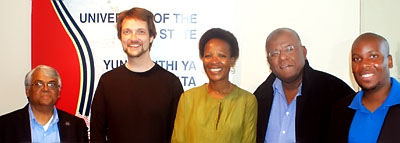Latest News Archive
Please select Category, Year, and then Month to display items
16 February 2024
|
Story ANTHONY MTHEMBU
|
Photo ROSINA MOTHIBA
 Prof Matseliso Mokhele-Makgalwa: Vice Dean; Research, Engagement and Internationalisation in the Faculty of Education at the University of the Free State (UFS).
Prof Matseliso Mokhele-Makgalwa: Vice Dean; Research, Engagement and Internationalisation in the Faculty of Education at the University of the Free State (UFS).
The Faculty of Education at the University of the Free State (UFS) proudly announces the appointment of Prof Matseliso Mokhele-Makgalwa as Vice Dean of Research, Engagement and Internationalisation, effective 1 January 2024. With a wealth of experience and a fervent dedication to academic advancement, Prof Mokhele-Makgalwa’s appointment marks a significant stride towards enhancing the faculty’s global presence and academic prowess.
Transitioning into a new role
Transitioning seamlessly from her previous role as Acting Vice Dean of Research and Postgraduate Studies, Prof Mokhele-Makgalwa perceives this new appointment as a natural progression, elevating her responsibilities to spearhead research endeavours, foster engagement, and cultivate international partnerships within the faculty. Embracing this pivotal role with enthusiasm, she underscores the importance of collaborative efforts among faculty members, securing research funding, and ensuring the quality and impact of scholarly outputs.
“I appreciate the opportunity to contribute significantly to the faculty’s research, engagement and internalisation efforts,” says Prof Mokhele-Makgalwa. “I look forward to collaborating with the faculty staff members to advance our academic initiatives on a broader scale.”
A vision of progression for the faculty
At the heart of her vision lies a commitment to realise the UFS’s Vision130, wherein Prof Mokhele-Makgalwa aims to elevate the international profile of the faculty, foster impactful research, promote engaged scholarship, and facilitate knowledge exchange on a global scale. Her strategic objectives also include positioning the faculty among the top three education schools nationally, reflecting her dedication to academic excellence and institutional advancement.
New York academic pays visit to UFS
2010-08-02
 |
Prof. Teboho Moja, a professor of Higher Education at NYU, paid a successful visit to the UFS. Here are, from left: Mr John Samuel, Interim Director: International Institute for Studies in Race, Reconciliation and Social Justice, UFS; Dr Bryan Urbsaitis, Assistant-Director of Study Abroad, Pace University, USA; Prof. Moja; Prof. Jonathan Jansen, Rector and Vice-Chancellor, UFS; and Dr Olihile Sebolai, Directorate Research Development, UFS.
Photo: Arthur Johnson
|
|
Prof. Teboho Moja, a professor of Higher Education from New York University (NYU), paid a fruitful visit to the University of the Free State (UFS). During her visit Prof. Moja, who is originally from South Africa, engaged with various stakeholders to further strengthen relations between the UFS and NYU.
Prof. Moja’s research focus is on the change in higher education and the implications of globalisation on higher education systems. As part of her visit to the UFS, Prof. Moja delivered a public lecture, entitled “Diversity oriented transformation for Teaching and Learning”. The lecture was presented by the Directorate Research Development and the International Institute for Studies in Race, Reconciliation and Social Justice.
Prof. Moja studied at the University of the Witwatersrand and obtained her Doctorate in Philosophy at the University of Wisconsin-Madison in the United States of America (USA).
In 1998 she became the first black woman to be appointed as chairperson of the council of the University of South Africa (UNISA). She is also an honorary professor at the University of Pretoria (UP).
On her visit to the UFS Prof. Moja was accompanied by Dr Bryan Urbsaitis from Pace University in New York and Ms Gina Canterucci from NYU. She also led a group of postgraduate students in International Education Studies. These students interacted with fellows from the Grow Our Own Timber Programme of the UFS. The interaction greatly contributed towards enhancing both student groups’ acuity on academic and social matters.
|